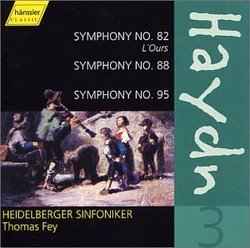Marching Band Haydn
Mark Amorose | Concord, CA United States | 01/21/2003
(2 out of 5 stars)
"I bought this disc after reading David Hurwitz's rave review at ClassicsToday.com. I respect Hurwitz's judgment: he is one of the few critics who recognize Haydn's music as second to none - not to Mozart's, not to Beethoven's, not to anyone's. So when he praised this disc as the first one to ever get these symphonies right, and backed up his praise with specific examples from the music, I had to hear it. Now I wish I could have heard it without first [paying for it]; these interpretations may be revolutionary, but revolutionary is not necessarily good.Thomas Fey's Heidelberg Symphony is a group of well-trained musicians, and Fey has carefully studied the scores; yet the results are unsatisfying. This is not to say that there are no insights here. Hurwitz has pointed out some of them in his review. For example, in the trio of Symphony 88, Fey takes seriously Haydn's "forte assai" ("very loudly") marking of the bassoons' drone, whereas other (recorded) versions all tone it down a bit for fear of drowning-out the melody. Fey shows that the melody can survive even a fortissimo drone: even if the character of the trio is therby made dramatically different from what we usually hear, who is to say that this interpretation, being more faithful to what Haydn wrote, is not the correct one? Perhaps we listeners had better root out our prejudices, as we have had to do more than once since the advent of period instruments and period performances. I'm all for fidelity to the "authentic" scores - I greatly enjoy Sir Charles Mackerras's Haydn, Christopher Hogwood's revolutionary "Surprise" Symphony, and to varying degrees the Haydn interpretations of Goodman, Weil, and Kuijken. However, a good interpretation requires more than esoteric insights. Fey's readings, for all their perceptiveness, fail. They do so for three reasons: (1) they are more the stringing-together of individaul insights than they are synthetic wholes: most of the movements of each of the symphonies lack any sense of flow - the listener is jarred by the bumpiness of discrete parts that never coalesce into a unified whole. (2) Despite the Heidelberg Symphony's self-promoting motto (as advertised in the accompanying booklet), "every performance is a first performance," these performances, where they are not shockingly different, are for the most part lackluster. They convey little of the bouyant spirit of Haydn's music. All of the aforementioned conductors and their ensembles do this music much better. (3) Worst - or at least most noticeable - of all, is the way in which Fey makes his brass and percussion completely dominate each of these three symphonies. Woodwinds are clearly present as well, but the strings (which, oddly, have a tone as thin as the thinnest period strings) can hardly be heard except where they play alone. Now, I am no Haydn scholar, but I doubt that Fey finds justification in Haydn's scores for this "marching band" approach; which approach is more than an annoying indiosyncracy - it makes much of the disc well nigh unlistenable. To give but one example, the lound tutti outbursts that open no. 95 sound like nothing so much as the soundtrack to an action-adventure movie: hardly worthy of Haydn.In short Fey's disc will not displace any of my favorite recordings of these symphonies (Marriner's "Bear," Weil's 88, or Szell's 95), nor any of my second or third favorites. I will hold onto this disc for its scholarly interest, until some other conductor incorporates Fey's insights into a coherent and enjoyable performance."
Beyond Good
Mark Amorose | 12/03/2002
(5 out of 5 stars)
"What an uplifting experience to encounter such a wonderful interpretation of Haydn! This lively rendition scorns those old Haydn recordings. Haydn LIVES in this exquisite recording! Thank you Thomas Fey and the Heidelberger Sinfoniker for such a brilliant performance!"


 Track Listings (12) - Disc #1
Track Listings (12) - Disc #1